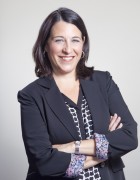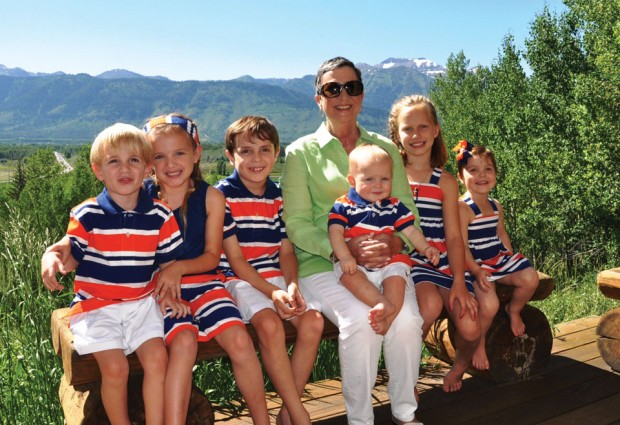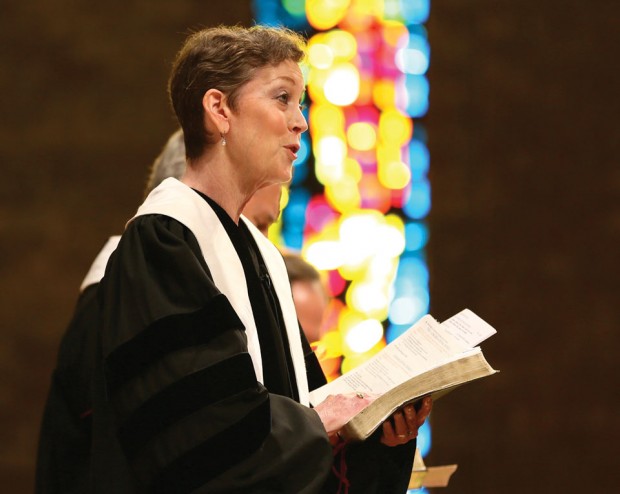With Little Warning
Ovarian cancer first felt like stomachache


Cathy Lang, who is being treated for ovarian cancer, has a moment with her grandchildren: (from left) Jonathan, 3; Julia, 7; Jack, 8; Walker (on lap), 1; Jessica, 8; and Caroline, 3, in Jackson Hole, Wyoming.
They say it comes with a whisper. Ovarian cancer. It can start with an inconspicuous annoyance that masks itself as digestive issues like bloating, cramping or constipation.
The symptoms can lead to a dangerous delay in diagnosis, making this cancer particularly scary, says Buzz-neighborhood resident Cathy Lang. Cathy is a grandmother, fly-fishing enthusiast and two-time breast cancer survivor who has spent the last year fighting her biggest battle yet.
“Breast cancer is bad, but ovarian cancer is worse because it’s so hard to detect and the cure rate is not good. It’s scary,” said Cathy. “There have been lots of tears. I have grandchildren I want to see grow up.”
In May 2013, almost 13 years after surviving breast cancer, symptoms mimicking stomach problems revealed ovarian cancer. Within a month Cathy had undergone a full hysterectomy and had begun aggressive treatment. Within four months she was in remission and could focus on living and fishing. She and her husband bought a vacation home in Jackson Hole, Wyoming.
“Don’t be afraid of what you have to do next,” said Cathy. “It’s like the whac-a-mole game. It pops up. You knock it down. It pops up again. You knock it down again.”
And that is the disheartening game Cathy finds herself forced to play again. In April of this year, more discomfort revealed small nodules in her abdomen. Within a month they doubled in size. She has spent her summer in Jackson Hole undergoing another aggressive regimen of chemotherapy.
The Centers for Disease Control reports that about 20,000 U.S. women get ovarian cancer each year and that about 75 percent of those women die within five years. If ovarian cancer is found and treated before the cancer has spread outside the ovary, the five-year relative survival rate is 92 percent, according to the American Cancer Society. However, only 15 percent of all ovarian cancers are found at this early stage. Ovarian cancer causes more deaths than any other cancer of the female reproductive system, the CDC says, but it accounts for only about 3 percent of all cancers in women.
Lead associate minister at Memorial Drive United Methodist Church and longtime area resident Suzy Reedstrom finds herself ministering most every day to those affected by cancer.
She didn’t predict she would have such a personal connection. She is in her third round of a three-year battle with ovarian cancer. It started with discomfort in the abdomen. She insisted on a colonoscopy that indirectly led them to the discovery of ovarian cancer.
“My colonoscopy saved my life,” said Suzy. “It revealed a tumor growing on the outside. It had attached itself to my colon, and that’s what was pushing, and thank God it did that or it would have been much longer.” The first surgery was a full hysterectomy, which led to a joyful 11 months of remission. Then more bad news. Each subsequent round has included a different drug or a different diet, but there has been one constant Suzy gives credit to.

Suzy Reedstrom, lead associate minister at Memorial Drive United Methodist Church, knows what she is talking about when she counsels others battling cancer.
“Women know their bodies better than anybody, and if something doesn’t seem right you have got to keep pushing to figure it out. I preach that constantly. I kept pushing. I wasn’t satisfied. I knew something wasn’t right. I think your body tells you that.”
The American Cancer Society says the most common symptoms of ovarian cancer include bloating, pelvic or abdominal pain, trouble eating or feeling full quickly, and urinary symptoms, such as the need to go urgently or frequently. The society says a woman should visit a doctor when she experiences any of these symptoms daily for more than a few weeks.
Despite feeling tired, Suzy hasn’t missed a full day’s work, and she graduated with her doctorate in ministry just last year. And she is spending more time with family, having weekly family dinners and making memories with her husband and two grown sons.
“I think it shakes up everything inside you. Then it has a ripple effect in your family. It’s hard to tell my boys I have cancer, and it’s hard to tell them each time it comes back,” she said. “I don’t have control over it, but I’m going to do everything in my power to beat it.”
Want more buzz like this? Sign up for our Morning Buzz emails.
To leave a comment, please log in or create an account with The Buzz Magazines, Disqus, Facebook, or Twitter. Or you may post as a guest.


